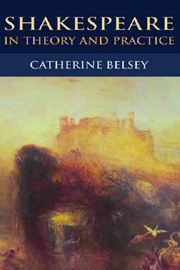Book contents
- Frontmatter
- Contents
- Preface
- 1 Introduction: Practising with Theory
- 2 Psychoanalysis and Early Modern Culture: Lacan with Augustine and Montaigne
- 3 Love as Trompe-l'oeil: Taxonomies of Desire in Venus and Adonis
- 4 Tarquin Dispossessed: Expropriation and Consent in The Rape of Lucrece
- 5 Antinomies of Desire and the Sonnets
- 6 Peter Quince's Ballad: Memory, Psychoanalysis, History and A Midsummer Night's Dream
- 7 The Illusion of Empire: Elizabethan Expansionism and Shakespeare's Second Tetralogy
- 8 Making Histories Then and Now: Shakespeare from Richard II to Henry V
- 9 The Case of Hamlet's Conscience
- 10 Iago the Essayist
- Notes
- Index
9 - The Case of Hamlet's Conscience
Published online by Cambridge University Press: 12 September 2012
- Frontmatter
- Contents
- Preface
- 1 Introduction: Practising with Theory
- 2 Psychoanalysis and Early Modern Culture: Lacan with Augustine and Montaigne
- 3 Love as Trompe-l'oeil: Taxonomies of Desire in Venus and Adonis
- 4 Tarquin Dispossessed: Expropriation and Consent in The Rape of Lucrece
- 5 Antinomies of Desire and the Sonnets
- 6 Peter Quince's Ballad: Memory, Psychoanalysis, History and A Midsummer Night's Dream
- 7 The Illusion of Empire: Elizabethan Expansionism and Shakespeare's Second Tetralogy
- 8 Making Histories Then and Now: Shakespeare from Richard II to Henry V
- 9 The Case of Hamlet's Conscience
- 10 Iago the Essayist
- Notes
- Index
Summary
What does Hamlet mean when he ascribes his own inaction to conscience?
Thus conscience does make cowards of us all;
And thus the native hue of resolution
Is sicklied o'er with the pale cast of thought,
And enterprises of great pitch and moment,
With this regard, their currents turn awry
And lose the name of action.
(Hamlet, 3.1.83–8)The variety of possible meanings of ‘conscience’ in the Elizabethan period has enabled its occurrence in Hamlet's most familiar soliloquy to be widely interpreted – or, as I hope to suggest, misinterpreted – to mean ‘consciousness’ (OED, I) rather than ‘knowledge of right and wrong’ (OED, II). For instance, many editions of the play gloss ‘conscience’ here as ‘consciousness’, ‘self- consciousness’ or ‘reflection’. Nothing in the lines themselves, however, implies this reading of the word. The apparent meaning of the text is fairly straightforward: the moral sense inhibits action by generating fear (of the consequences). ‘Conscience’ occurs several times in the rest of Hamlet where it seems to need no gloss, and it refers consistently to the faculty that distinguishes between good and evil. Six lines before the beginning of this soliloquy Claudius has given the audience the first indication of his guilt, when he says, ‘How smart a lash that speech doth give my conscience!’ (3.1.50). The word is common in the rest of Shakespeare and it tends generally to occur in the sense familiar from much Renaissance and later moral writing to mean the element in human beings that is ‘appointed of God to declare and put in execution his just judgement against sinners’, a moral arbiter, whose function is ‘to judge of the goodnes or badnes of thinges or actions’.
- Type
- Chapter
- Information
- Shakespeare in Theory and Practice , pp. 139 - 156Publisher: Edinburgh University PressPrint publication year: 2008

